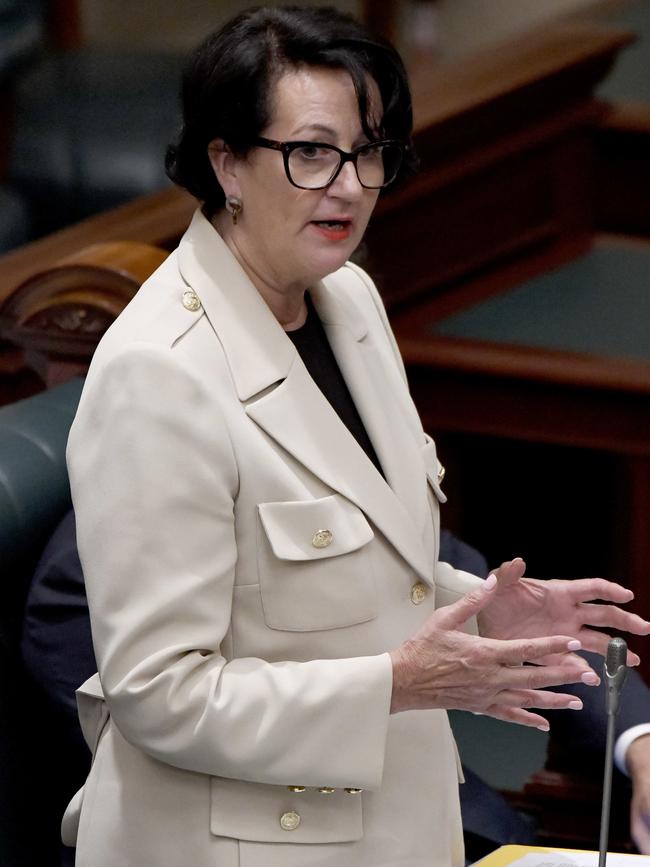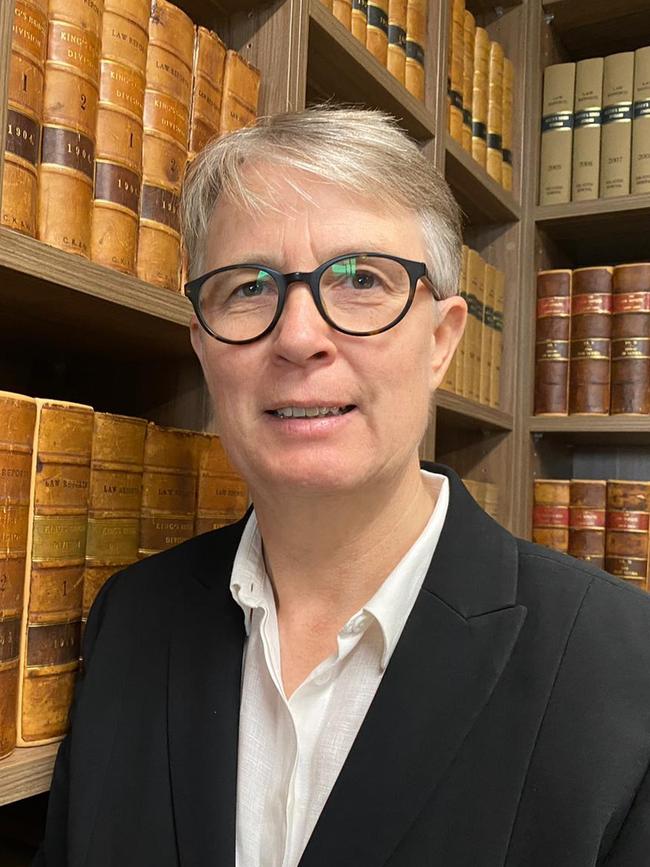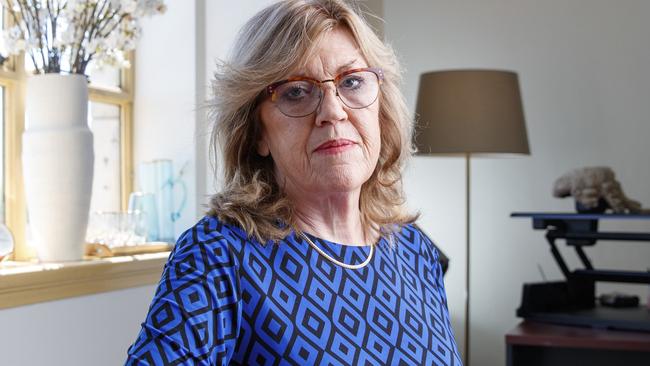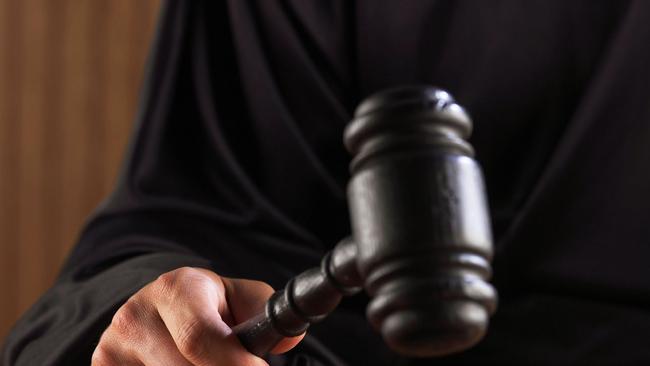Report into SA legal profession finds profession rife with ‘appalling sexual harassment’, including by judges
A shocking report has found “extremely disturbing, appalling” sexual harassment is rife in SA’s legal profession – including gross and lewd actions by judges.
Police & Courts
Don't miss out on the headlines from Police & Courts. Followed categories will be added to My News.
Sexual harassment, bullying and intimidation go all the way to the top in SA’s legal profession, a report has found – including gross and lewd actions by judges.
The report, released today, has also exposed a longstanding culture in which victims feel it is better to “simply move on” to a new job rather than suffer “professional retribution”.
It found 69 per cent of lawyers who had experienced harassment did not report it as part of a workplace culture that encouraged people “not to rock the boat”.
It also found more than 80 per cent of victims were harassed by a more senior member of the profession “including members of the judiciary”.
One woman said she had reported a lawyer’s gross conduct to a judge, who replied: “I would like to throw you to the floor and f--- you now, I love strong women”.
Respondents described dealing with “serial offenders” amongst the profession’s senior ranks, including a magistrate who sent sexually explicit texts to staff while cases were being heard.
“(A male lawyer) said ‘you do know I want to f--- you, don’t you? I’ll wear you down’ … he also said he was going to get me drunk and take advantage of me,” one woman reported.
Another – a salaried partner at a major firm – said she had been “jumped” by a junior male lawyer when she was the last to leave a Friday night function.
A clerk, meanwhile, reported enduring years of “relentless bullying” by a barrister which culminated in him pinning her against a desk and “rubbing his groin” against her.
The barrister, she told the report, had continued speaking during the incident and told her “men could be excused for being creeps sometimes”.
Equal Opportunity Commissioner Jodeen Carney said 16 recommendations had been made to address what she described as “extremely disturbing, appalling behaviour” in the public and private sectors.


Attorney-General Vickie Chapman said the report’s findings were alarming, and that the State Government would consider the recommendations.
“This review is an unpleasant read but a crucially important document,” she said.
“The fact that nearly half of the respondents who’d experienced some form of sexual harassment didn’t report it because they were concerned of the impact it may have on their careers is unacceptable.
“This should not happen in a contemporary workplace.”
In a statement, the State Courts Administration Council said it was “very concerned” about reports made to the inquiry.
However, it noted the report “did not detail incidences of harassment perpetrated by any sitting judicial officer”.
“Overbearing and bullying behaviour is totally unacceptable,” it said.
“The council will continue and increase its efforts to stop it happening and support our employees who have suffered this behaviour.”
Barrister Claire O’Connor SC said women had spoken out “many times” about harassment in the profession without adequate changes being made.
She said the recommendations should be implemented immediately.
“We cannot keep asking victims what they want done or asking them to provide solutions – they want this to stop, they want it to not happen anymore,” she said.
“This behaviour has gone on, it’s become entrenched, it’s grooming behaviour, it’s seen as the norm in many areas of the law and it must stop.
“This report must result in an impetus for change and for addressing these problems.”

The inquiry was launched in November last year following calls by MLC Connie Bonaros, who was allegedly assaulted by MP Sam Duluk at a 2019 Christmas party.
Duluk is due to stand trial for that alleged offending in the Adelaide Magistrates Court in June.
On Tuesday, Ms Bonaros welcomed the “long overdue” findings and called on Ms Chapman to “act immediately” upon its recommendations.
“This is a defining moment for the state’s legal profession – and the line has finally been drawn in the sand from today,” she said.
“The report confirms what every lawyer in this town has known for years but has been swept under the carpet by so many – that is, sexual harassment is rife within the state’s legal profession.
“The community has every right to expect its lawmakers to be subject to the very same laws they make for everybody else.
“There should not be – and there cannot be – one standard for the common person and another for judges or lawyers, or anyone else for that matter.”
The inquiry was conducted separately to a plan launched by Supreme Court Chief Justice Chris Kourakis to have all lawyers and judges undergo compulsory anti-harassment training.
The report, based on 622 responses and written by former acting commissioner Steph Halliday, found 50.5 per cent of lawyers had experienced harassment.
More than half of the female respondents reported having been harassed, while a third of all respondents said they had been harassed more than once.
Just 13.6 per cent of male respondents reported having suffered harassment at work, most often in the form of sexually explicit pictures, posters or gifts.
One man reported a senior female lawyer would “only hire male clerks” for short-term positions, referring to them by “inappropriate physical characteristics”.
Another said a senior female colleague had become “rude and aggressive, and remains so” after he refused her repeated suggestions they have an affair.
A third said his male peers criticised him for rejecting such advances, saying “you idiot, you should have taken it up, what sort of man are you?”.
Three quarters of respondents had experienced sexual harassment in the office, while more than half had been victimised at work events.
More than 80 per cent of victims were in less senior positions than those engaging in the harassment.
Almost 20 per cent reported being harassed by a client or a witness in a case, most often by text message.
“(A client called and said) ‘I hope you are wearing a short skirt because my car is quite high up and I want to see up your skirt’,” a respondent told the report.
“When I told my bosses they just stared at me … at that moment – at the age of 24 – I realised that the client was more important than me.”
In 46.1 per cent of harassment cases, there were no consequences for the abusive person.
The bulk of the harassment came in the form of sexually suggestive comments or jokes (67.4 per cent).
“(A male lawyer) asked me if I had dirty knees, and (said) there’s only one thing that could have meant,” a woman reported.
“Other people were there, and they didn’t say anything.”
Other forms of harassment included suggestive staring and leering (47.7 per cent) and inappropriate personal questions (47.4 per cent).
A female lawyer reported being quizzed, by a senior male colleague, about the property settlement in her divorce and feeling “obliged to answer” despite embarrassment.
Unwanted touching accounted for 43.9 per cent, with stalking at 8.8 per cent and sexual violence or assault at 2.5 per cent.
A woman told the report that, while a junior lawyer, a more senior colleague repeatedly attempted to touch and kiss her, and remove her clothing.
Another – a university student – said that, while on work experience, a “senior male in the profession” exposed himself to her and “told her to suck it”.
“I felt I had nowhere to go without risking my future career.” a respondent told the report.
“I thought ‘why would anyone believe a young female over a powerful older male lawyer that everyone seems to respect and revere?’.”

The report identified the profession’s “drivers of harassment” as being its:
PATRIARCHAL, hierarchical culture of intense competition.
LACK of cultural diversity, particularly a dearth of practitioners identifying as Aboriginal and Torres Straight Islander.
DEEPLY entrenched gender bias that “underpins discriminatory behaviour”.
CULTURE of silence that minimises and normalises instances of harassment.
LACK of trust, by practitioners, in the currently-available reporting processes for harassment and discrimination.
Those factors led to discrimination on the basis of sex (50.6 per cent), age (27.9 per cent) and race (15.8 per cent).
Women who had children reported being discriminated against frequently, with pregnancy treated as a “lack of commitment” to the firm or profession as a whole.
Almost half of respondents said they had witnessed an incident of harassment, describing the legal profession as “a boy’s club” that was secretive about earnings and salaries.
The growing number of women in the profession, the report found, was having little effect upon the prevalence of harassment in its ranks.
Reports of harassment, it said, remained “trivialised or disregarded” by those with the power to generate genuine change.
“We were told that, if we reported assaults, we would be unemployable … we know our rights but we are too scared to enforce them,” one woman said.
“We know we will be silenced with nondisclosure agreements in return for paltry sums while we will never be hired in the legal profession again.
“It is a small profession, and the power is still held by a few old white, conservative men.”
The Courts Administration Authority, which oversees the operation of the state’s courts, was singled out for criticism by the report.
In a section echoing ongoing disputes over the treatment of sheriff’s officers, the report says the CAA’s culture “tolerates incivility” including sexual and discriminatory harassment.
“Bullying, harassment and intimidation starts at the top,” a respondent told the report.
“The numbers of Justices, judges and magistrates I have seen bullying and intimidating all variety of staff, and court visitors, is disgraceful.
“CAA managers see what these judges say and do and simply get away with their behaviour or conduct uninhibited, so they follow suit.
“Within the CAA, it is often acknowledged as a ‘joke’ that certain judicial officers are ‘just like that’.
“That confirms the belief that if a report were to be made, no action would be taken and the person making the report would be ostracised.”
Ms Halliday concludes the report by making recommendations including:
LEGAL profession stakeholders, including universities, immediately review and update anti-harassment and ethics policies.
THE Courts Administration Council develop annual anti-harassment programs for professionals.
THE Legal Practitioners Disciplinary Tribunal appoint members “from culturally and linguistically diverse backgrounds” with expertise in dealing with sexual harassment and trauma.
Ms O’Connor welcomed the report’s focus on diversity.
“Where there is power held predominantly by white males in an organisation or profession, that power will be – in my view – subject to abuse upon other people,” she said.
She said the report “clearly” showed women faced issues reporting harassment to oversight and peak bodies.
“Women need to be able to report complaints in a manner in which they will be respected, that will be investigated properly, and will be conducted without repercussions,” she said.
“That’s half the problem … the rest of the problem is how to stop this conduct, it happens before our eyes and we’ve all seen it happen or have experienced it.
“We must start systemically reviewing the profession, take a hard look at this conduct and how it has occurred – because this is conduct that ruins lives.”
Ms Carney said the behaviour must cease.
“(Interviewees) described instances of appalling behaviour and complacent attitudes from colleagues,” she said.
“They outlined a workplace culture where people feel they need to simply ‘move on’ for fear of professional retribution.”
Ms Chapman said she would provide both the review and its findings to the Courts Administration Authority and the Law Society.
Law Society of SA president Rebecca Sandford commended harassment victims who took part in the inquiry for their bravery.
“The report and all its recommendations will now be carefully considered by the Society’s council in consultation with committees and the broader membership,” she said.
“Following (that), a more detailed response will be issued.”
The Courts Administration Council said it would “adopt the recommendations relevant to the Courts Administration Authority”.





